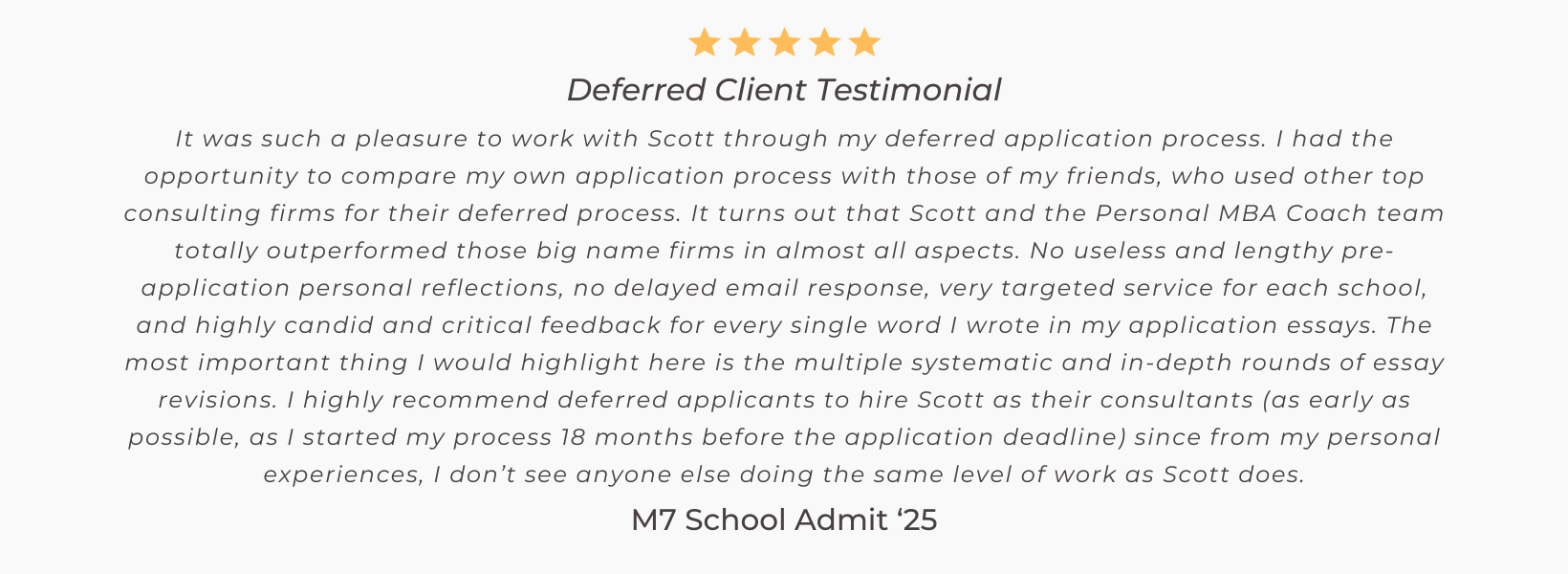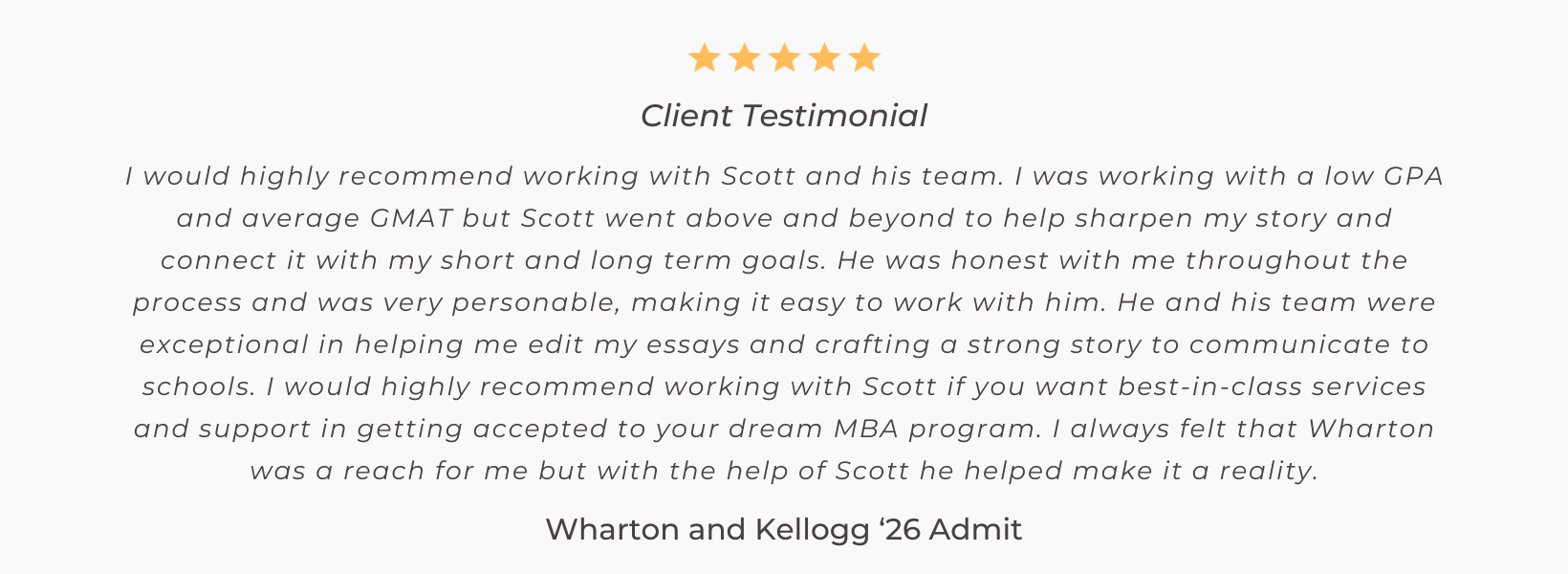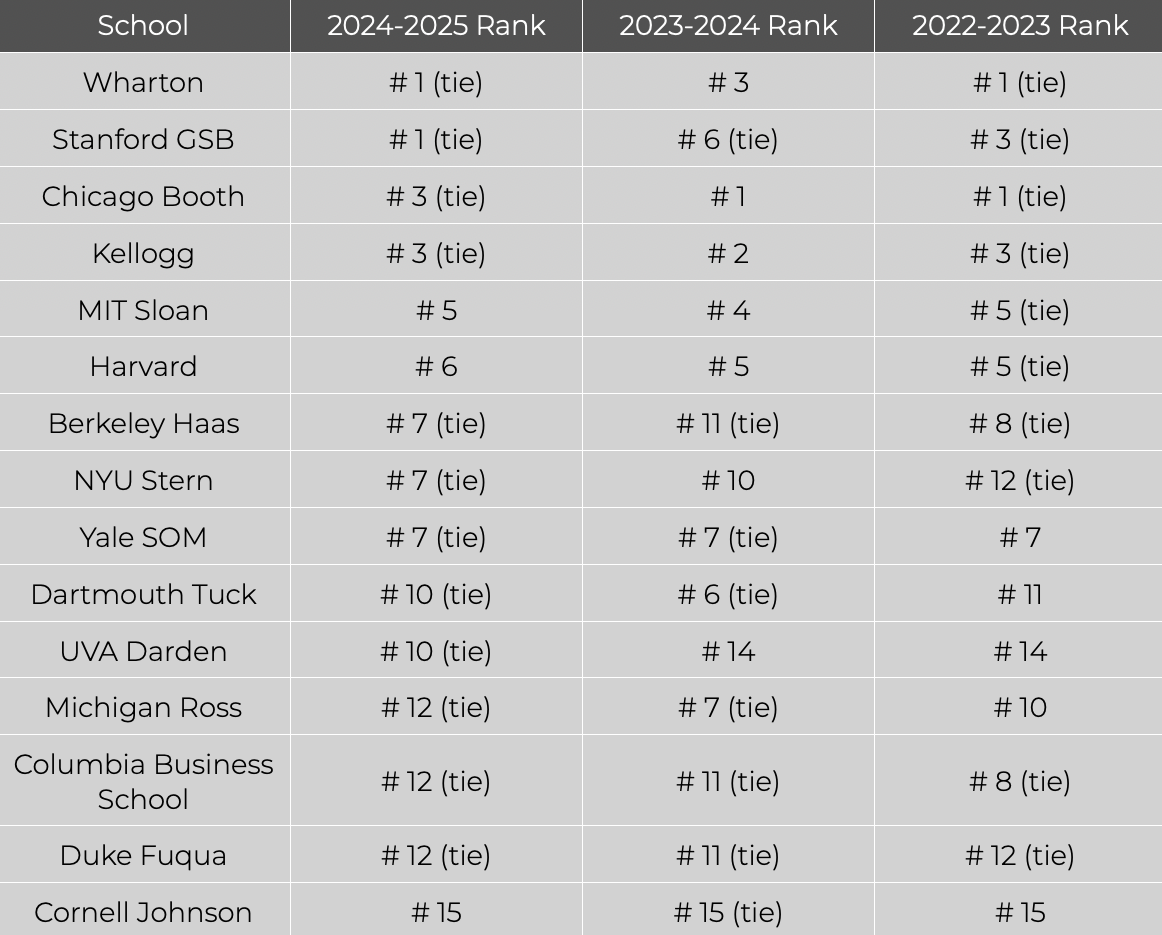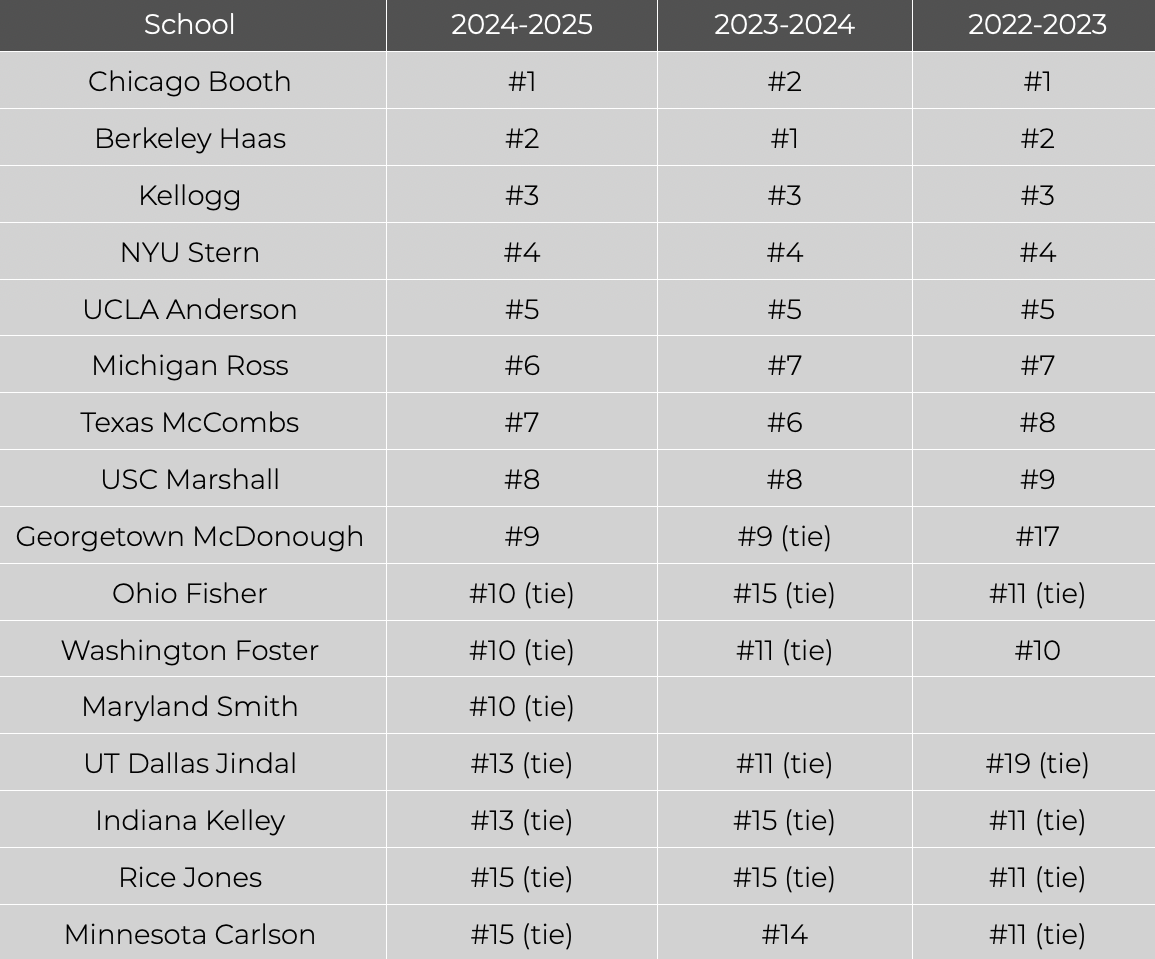Events & Promotions
|
|

GMAT Club Daily Prep
Thank you for using the timer - this advanced tool can estimate your performance and suggest more practice questions. We have subscribed you to Daily Prep Questions via email.
Customized
for You
Track
Your Progress
Practice
Pays
Not interested in getting valuable practice questions and articles delivered to your email? No problem, unsubscribe here.
- Nov 19
09:00 AM PST
-10:00 AM PST
What’s in it for you- Live Profile Evaluation Chat Session with Jenifer Turtschnow, CEO ARINGO. Come with your details prepared and ARINGO will share insights! Pre-MBA Role/Industry, YOE, Exam Score, C/GPA, ECs Post-MBA Role/ Industry & School List. - Nov 19
10:00 AM EST
-01:00 PM EST
Get expert MBA strategy, instant essay feedback, and personalized advice on your entire application. Join My Admit Coach, the AI-powered MBA admissions platform built on 10K+ successful application docs for HBS, Stanford GSB, MIT and other top programs. - Nov 19
11:00 AM EST
-12:00 PM EST
Looking to secure a coveted spot at a top business school? Our team of seasoned MBA admissions consultants, including top B schools alumni and industry leaders, is here to help turn your dreams into reality. Let’s kick-start your journey to success! - Nov 19
11:00 AM PST
-12:00 PM PST
Round 2 is here — and it’s your chance to make your MBA dream happen! Join GMAT Club’s LIVE discussion with two top experts from The Red Pen, Gunjan Jhunjhunwala and Natasha Mankikar, as we break down everything you need to know - Nov 20
07:30 AM PST
-08:30 AM PST
Learn what truly sets the UC Riverside MBA apart and how it helps in your professional growth - Nov 12
01:00 PM EST
-11:59 PM EST
Get expert MBA strategy, instant essay feedback, and personalized advice on your entire application. Join My Admit Coach, the AI-powered MBA admissions platform built on 10K+ successful application docs for HBS, Stanford GSB, MIT and other top programs. - Nov 20
10:00 AM EST
-10:30 AM EST
If you’re applying to Columbia, NYU Stern, or Yale SOM, you need more than strong stats. Each school defines “leadership” differently, and your essays must reflect that. Join Sia Admissions founder, Susan Berishaj on November 20th - Nov 20
09:00 PM IST
-10:00 PM IST
Join our free expert-led Essay Workshops to discover how to choose impactful stories, highlight your core values, and align your background with each school’s distinct culture, making every word truly count. - Nov 21
08:30 AM EST
-09:15 AM EST
Get the inside scoop on what makes Emory’s Goizueta Business School great, learn how you can present a strong MBA application, and connect with an Admissions Director to get your questions answered. - Nov 21
12:00 PM EST
-12:30 PM EST
Join Assistant Dean for Admissions Laurel Grodman for a live walkthrough of the 2025–2026 MBA application. Laurel will provide insights into what the Admissions Committee looks for and offer tips on key components of the application. - Nov 21
09:30 PM IST
-10:30 PM IST
Learn how to craft powerful, authentic essays by mastering the 3 “WHYs” every top MBA program looks for: Why MBA, Why Now, and Why This School. - Nov 24
08:00 PM PST
-09:00 PM PST
Inquire for a free profile evaluation and guarantee statement for possible admits and scholarships!
PersonalMBACoach
 Expert
Expert
Personal MBA Coach Founder
Joined: 11 Sep 2010
Last visit: 19 Nov 2025
Posts: 3,756
Own Kudos:
Given Kudos: 11
Status:Boutique MBA Admissions Consulting from a Wharton graduate - Helping applicants get into top global business schools since 2008
Affiliations: Wharton, MIT
Location: United States (NY)
Overall Client Admit Rate: 96%
Expert reply
Kudos
Bookmarks
| FROM Personal MBA Coach: London Business School Essay Tips: 2023-2024 |
|
If you are seeking an MBA program with a global community and access to a major city, London Business School may be a great option for you. With acclaimed professors and visiting speakers from around the world, and students representing 63 nationalities in the class of 2025, London Business School is truly a global hub. Information on the class of 2025 also notes that 43% of students identify as female, and students come from a variety of industry backgrounds. If you have decided that the London Business School full-time MBA program is a good fit for you, check out Personal MBA Coach’s tips below for tackling the LBS MBA essay questions. Once again, the London Business School application will ask applicants to answer one required essay question. This year, the school is minimizing changes and keeping the question the same as the previous application cycle. London Business School gives candidates the opportunity to answer an optional essay question as well, which also remains the same this year. London Business School’s MBA Essays for 2023-2024:  Personal MBA Coach’s London Business School Essay Tips: LBS Essay 1: What are your post-MBA goals and how will your prior experience and the London Business School programme contribute towards these? (500 words maximum) This is a standard goals essay. Personal MBA Coach recommends beginning your essay by providing some background context about yourself and detailing your career accomplishments to date. This does not mean that applicants should detail their entire careers or repeat what is on their resume. However, LBS is looking to understand how your past career has prepared you to achieve your goals. Therefore, you should include some discussion of your career in terms of how it relates to your aspirations. After sharing this background information, go on to discuss your MBA goals. If you are having trouble articulating your goals, take a look at Personal MBA Coach’s six key pieces of essay advice. This section should be a good portion of your essay and should include a specific short-term and long-term goal. Finally, the remainder of your essay should specifically discuss how attending London Business School will help you accomplish these goals. Be sure to research everything that London Business School’s MBA program has to offer and detail what you plan to take part in on campus. Is there a class you want to take? A club you hope to join? Mention these here and clearly explain how they relate to your MBA goals. Keep in mind that LBS is an international program, and a strong essay will explain why this is important to you.  LBS Essay 2 (Optional): Is there any other information you believe the Admissions Committee should know about you and your application to London Business School? (500 words maximum) While Personal MBA Coach normally does not advise most candidates to complete optional essays, you should consider answering this essay. This is the chance to tell London Business School a bit more about who you are and what makes you unique. Possible topics to cover here include extracurricular leadership roles or other work that is not presented in the rest of your application. This could be a personal story, triumph, or a side project you were involved in. Want to learn more about the London Business School full-time MBA program? Visit Personal MBA Coach’s LBS school page for more information on what sets the program apart. Ready to apply? Reach out today to find out how we can help with our Comprehensive Packages! The post London Business School Essay Tips: 2023-2024 appeared first on Personal MBA Coach. |
This Blog post was imported into the forum automatically. We hope you found it helpful. Please use the Kudos button if you did, or please PM/DM me if you found it disruptive and I will take care of it.
-BB
PersonalMBACoach
 Expert
Expert
Personal MBA Coach Founder
Joined: 11 Sep 2010
Last visit: 19 Nov 2025
Posts: 3,756
Own Kudos:
Given Kudos: 11
Status:Boutique MBA Admissions Consulting from a Wharton graduate - Helping applicants get into top global business schools since 2008
Affiliations: Wharton, MIT
Location: United States (NY)
Overall Client Admit Rate: 96%
Expert reply
Kudos
Bookmarks
| FROM Personal MBA Coach: How to Approach the 2023-2024 Consortium Essays |
|
Are you interested in applying to business school via The Consortium? The next deadline is just over a month away. Since 1966, The Consortium has offered over $465 million in merit-based fellowships to MBA students across the country. The Consortium was founded under the mission of equipping African American men with the business skills required to land positions in American corporations. In 1970, Consortium membership opened up to women, as well as Hispanic Americans and Native Americans. In 2004, membership opportunities expanded to encompass all U.S. citizens and permanent residents of any race or ethnicity who are committed to The Consortium’s mission of “helping to reduce the serious underrepresentation of African Americans, Hispanic Americans and Native Americans in both our member schools’ enrollments and the ranks of management.” Below, please find this year’s deadlines, along with Personal MBA Coach’s tips on how to tackle the Consortium MBA application essays. The 2023-2024 Consortium Deadlines are: Consortium Early Application Deadline: Oct. 15, 2023 Consortium Traditional Application Deadline: Jan. 5, 2024 Consortium Admission Decision and Fellowship Notification: Varies by school Personal MBA Coach’s Consortium Essay Tips Consortium Core Essay 1: Please describe your short- and long-term goals post-MBA. How has your professional experience shaped these goals and influenced your decision to pursue an MBA degree? (2,000 characters max) For this first core Consortium essay, with 300 or so words, you want to mention your specific short- and long-term goals and connect how your work thus far has prepared you for and cemented your belief in those goals. For example, “Working in environmental consulting has strengthened my conviction in the need for XXX and my commitment to make the world a better place.” You can even mention how your goals are suited to you personally: “My appreciation for the beauty of nature continues unabated and feeds my interest in preserving this world for future generations.” To find out more on how to think about and articulate your goals, check out: How to Think About Your MBA Goals. Consortium Core Essay 2: (Optional Essay): Is there any other information you would like to share with us that is not presented elsewhere in your application? (1,000 characters max) We recommend using this optional Consortium essay only for special or extenuating circumstances that you do not have occasion to mention elsewhere: gaps in employment, poor academic performance one year, or a personal crisis that affected your life. For more insights, read this blog.  Consortium Membership Application Essays Our mission, through the strength of our growing alliance and extended network, is to enhance diversity and inclusion in global business education and leadership by striving to reduce the significant underrepresentation of African Americans, Hispanic Americans and Native Americans in both our Member Schools’ enrollments and the ranks of global management across the following sectors: for-profit corporations, nonprofit corporations, government agencies and contractors, and entrepreneurial ventures in both for-profit and nonprofit environments. Please address the three essay questions using specific examples pertaining to our target populations and clearly articulate your involvement, action, and results. What have you done pre-MBA in your business, personal, or academic life to demonstrate commitment to this mission? (2,000 characters max) In this short Consortium essay (about 300 words) you want to establish the first part of the continuum of your commitment to diversity and inclusion: what you have done so far. With limited space, get to the specifics quickly. It does not matter if it is in the realm of business or a student or civic organization: the important thing is that you show the leadership skills you employed and the contribution of your ideas in carrying out this important mission. What will you do while enrolled in your MBA program to demonstrate your commitment to the mission? (2,000 characters max) Since you have already established your record on diversity and inclusion in the previous Consortium essay, here, again, with about 300 words at your disposal, you want to go directly into what you plan to do during your MBA to continue in that mission. This is your chance to mention clubs, classes, or other programs where you will put yourself in a position to effect change, to lead, and/or to catalyze dialogue. Show not only how you will apply your experience to something but also what you hope to learn that could enrich your contribution to the mission in the future.  What will you do post-MBA with respect to community service and leadership involvement to demonstrate your continued commitment to The Consortium’s missions of diversity and inclusion? (1,000 characters max) This Consortium essay is even shorter, so in this brief space connect the final piece: In your future role, how will you contribute to diversity and inclusion in your workspace or field? Cite specific ideas. Generalities such as “In my role I will hire more diverse employees” will not suffice. In terms of community service, if you already are very committed to an organization or a type of community service, say how you will strengthen that with your newly gained insight. If not, think about how you will seek a new avenue to contribute to diversity and inclusion. As always, be specific. Looking for guidance during the Consortium MBA application process? Personal MBA Coach is here to help you maximize your chances of admission via our comprehensive packages.  The post How to Approach the 2023-2024 Consortium Essays appeared first on Personal MBA Coach. |
This Blog post was imported into the forum automatically. We hope you found it helpful. Please use the Kudos button if you did, or please PM/DM me if you found it disruptive and I will take care of it.
-BB
PersonalMBACoach
 Expert
Expert
Personal MBA Coach Founder
Joined: 11 Sep 2010
Last visit: 19 Nov 2025
Posts: 3,756
Own Kudos:
Given Kudos: 11
Status:Boutique MBA Admissions Consulting from a Wharton graduate - Helping applicants get into top global business schools since 2008
Affiliations: Wharton, MIT
Location: United States (NY)
Overall Client Admit Rate: 96%
Expert reply
Kudos
Bookmarks
| FROM Personal MBA Coach: Can I Really Finish My Applications in Time? |
|
It is hard to believe that December is here and the first round 2 application deadline is just under three weeks away (see deadline summary below). The holiday season is hectic for everyone, but for those of you working on your MBA applications, this can be a particularly challenging time of year.  You may be doubting whether you can get everything done on time. Personal MBA Coach prides itself on offering honest feedback, so here is the good, the bad and the ugly! The Good News: Many of you can still meet early January deadlines! Wondering if you can really work your magic and finish in time? Ask yourself these three questions: 1) Have you already narrowed down your school list? 2) Have you taken (or are prepared to take) the GMAT/GRE?* *You may skip this question if your target school offers test waivers: more on that here. 3) Do you have a large portion of your holiday vacation set aside to work on your applications? If you answered “yes” to most or all of these questions, do not despair! Plus, even if you do not reach your ideal score come submission date, candidates for whom a low score is the admissions committee’s only concern are often waitlisted and given the opportunity to submit a higher score at that time. So if you have not put pencil to paper (so to speak) for your essays, resume and short answer questions, you can still finish on time with the proper dedication. We have successfully guided candidates with a shortened timeline for a limited number of schools (and adding additional schools in future rounds or years as needed). But do not wait much longer! Check out our Comprehensive Packages and schedule a consultation today.  The Bad News: If you answered “no” to a few of these questions (most importantly question #3), you have your work cut out for you; honestly, you may not be ready this year. In this case, particularly if you have not finished your testing and do not have recommenders nailed down or schools identified, ask yourself how crucial it is that you apply THIS year. If now is really your time (perhaps you have 4+ years of experience and have plateaued at work or 2024 is an ideal year, personally, for you to start school), you may be able to meet the challenge. However, if you do not feel this level of urgency, we generally advise candidates to apply when they can submit the strongest applications, which might not be now. While you can successfully reapply, each application will remain on record; therefore, we do not advise submitting applications to which you have not given at least 100%. The Ugly News: If you have answered “no” to all of the questions above, January 3 may not be realistic for you (though some schools offer mid/late January deadlines that could still be feasible). This is particularly true if holiday obligations will prevent you from dedicating the majority of your time to your applications. Regardless of which boat you are in this year, there is still plenty that you can do now. Even if you do not end up hitting submit in January, early planning can always work in your favor. Not sure which category you are in? Personal MBA Coach also offers One-Time Gut Check services to help you understand where you stand, reach out today to schedule a consultation! The post Can I Really Finish My Applications in Time? appeared first on Personal MBA Coach. |
This Blog post was imported into the forum automatically. We hope you found it helpful. Please use the Kudos button if you did, or please PM/DM me if you found it disruptive and I will take care of it.
-BB













































